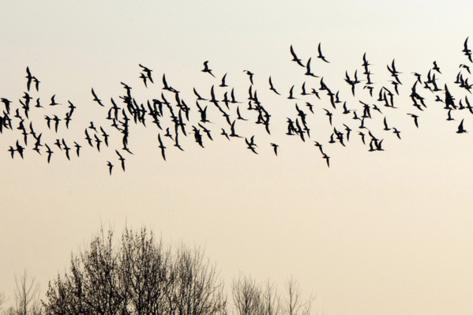Hurricane Helene spawns mass migration of a half-billion birds
Published in Outdoors
PITTSBURGH — As millions of people braced for destruction in the path of Hurricane Helene in Florida and other southeastern states, half a billion migrating birds capitalized on the strong storms.
Using radar and weather data, the Cornell Lab of Ornithology's BirdCast bird migration map documented more than half a billion birds migrating last Thursday night into early Friday.
While the hurricane caused birds in Florida and elsewhere to hunker down, the birds west of the hurricane rallied in huge numbers to surf the winds for a better ride heading south to their wintering grounds.
The peak of Thursday night's migration occurred around 10 p.m., close to when Hurricane Helena made landfall, said Andrew Farnsworth, a visiting scientist at the Cornell Lab of Ornithology and a bird migration ecologist.
There were about 530 million birds aloft Thursday night with the highest concentrations in Louisiana, Mississippi and other areas west of the hurricane, he said.
Conversely, on the BirdCast map, there's a huge black hole from Florida to Kentucky and West Virginia where the birds were not migrating, avoiding the circulation of the storm.
A large concentration of birds migrating south from Alaska, Canada, and the Northeastern U.S. changed their migration route on Thursday, said Bob Mulvihill, ornithologist at Pittsburgh's National Aviary.
"Birds were already avoiding the Atlantic flyway ahead of when the hurricane made landfall," said Mulvihill, who follows BirdCast migration reports.
They turned west below Michigan.
"This time of year the birds are in a physiological state or condition to go and to get to their wintering grounds in a timely fashion. A delay is potentially costly," he said.
Those birds already migrating still headed south, but took a different route.
"They avoided the shadow of the storm and rode along the edge of the system which would put them into the Mississippi flyway. They joined the concentration of migrants flying down the middle of the country," Mulvihill said.
The birds' abrupt change in their migration route shows that they are not merely programmed to go from point A to point B.
"They have an ability to be flexible in the face of changing weather and that is a good thing," Mulvihill said.
Hurricane Helene hit near the peak of fall bird migration when 10 to 20 million birds can fly over just the state of Florida in one night, Farnsworth said.
Many species of summer breeding birds in North America fly south to wintering grounds in Florida, Mexico, the Caribbean, Central America and South America.
During fall migration in Florida, about 600 million birds pass, Farnsworth said.
"Interesting things happen when large and intense storms pass," he said.
The circulation of a storm, particularly the west side of it, provides favorable flight conditions for migrating birds, he said.
That's what happened Thursday night.
As storms are passing, and afterward, tailwinds support birds moving in a certain direction, Farnsworth explained.
Previous research on birds equipped with transmitters has shown they avoid storms by stopping and waiting them out or some birds will fly toward the storms and move with them, Farnsworth said.
"Birds in the path of an approaching storm shut down their migration. They sense different things in the environment such as the speed of passing clouds. Some of the same kinds of things humans see."
Inevitably, some birds die in storms but many survive, Farnsworth said. The birds will hide in the holes of trees, the ground, buildings and thick bushes.
There's still more to learn about migrating birds and how they respond to weather conditions, he added.
Available free to the public, BirdCast is followed by birdwatchers nationwide to track bird migrations in the spring and fall.
(c)2024 the Pittsburgh Post-Gazette Distributed by Tribune Content Agency, LLC.







Comments